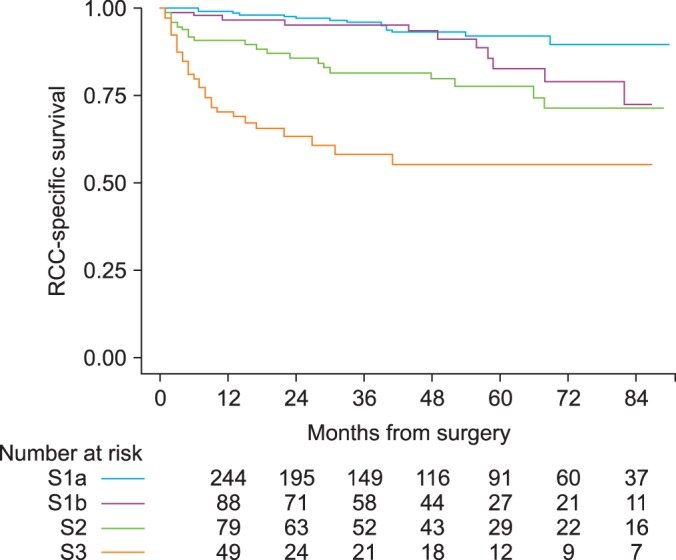Korean J Urol.
2014 Aug;55(8):505-510. 10.4111/kju.2014.55.8.505.
Associations Between Presenting Symptoms, Clinicopathological Parameters, and Prognosis in a Contemporary Series of Patients With Renal Cell Carcinoma
- Affiliations
-
- 1Department of Urology, Medical University of Vienna, Vienna General Hospital, Vienna, Austria. tobias.klatte@gmx.de
- 2Department of Urology, Centre Hospitalier Universitaire Vaudois, Lausanne, Switzerland.
- 3Clinical Institute of Pathology, Medical University of Vienna, Vienna General Hospital, Vienna, Austria.
- KMID: 1794583
- DOI: http://doi.org/10.4111/kju.2014.55.8.505
Abstract
- PURPOSE
To evaluate the impact of presenting symptoms on survival in a contemporary series of patients with renal cell carcinoma (RCC).
MATERIALS AND METHODS
We prospectively recorded data on the presenting symptoms, pathology, and RCC-specific survival of 633 consecutive RCC patients who underwent surgery between 2003 and 2012.
RESULTS
Four hundred thirty-three RCCs (68%) were incidental, 111 (18%) were associated with local symptoms, and 89 (14%) were associated with systemic symptoms. Among those with incidental RCC, 317 patients (73%) were completely asymptomatic and 116 patients (27%) presented with symptoms not related to the tumor. During a median follow-up interval of 40 months (interquartile range: 39 to 69 months), 77 patients died from RCC. In univariate analyses, symptom classification was significantly associated with RCC-specific survival (p<0.001). Patients with incidental RCC and unrelated symptoms tended to have worse prognosis than did patients who were completely asymptomatic, although this difference was not statistically significant (p=0.057). The symptom classification was associated with advanced TNM stages (p<0.001) and grade (p<0.001).
CONCLUSIONS
This study confirms that presenting symptoms are associated with tumor characteristics and survival. The majority of RCCs are diagnosed incidentally in patients without any symptoms or with symptoms not related to RCC. Patients in the latter group tend to have a worse prognosis than do patients who are completely asymptomatic. With the increasing number of incidentally diagnosed RCCs, substratification of patients with incidental tumors may be prognostically relevant.
Keyword
MeSH Terms
Figure
Reference
-
1. Pytel A. Extrarenal symptomatology in renal cancer. Int Urol Nephrol. 1974; 5:241–247. PMID: 4829130.
Article2. Homma Y, Kawabe K, Kitamura T, Nishimura Y, Shinohara M, Kondo Y, et al. Increased incidental detection and reduced mortality in renal cancer: recent retrospective analysis at eight institutions. Int J Urol. 1995; 2:77–80. PMID: 7553292.3. Palsdottir HB, Hardarson S, Petursdottir V, Jonsson A, Jonsson E, Sigurdsson MI, et al. Incidental detection of renal cell carcinoma is an independent prognostic marker: results of a long-term, whole population study. J Urol. 2012; 187:48–53. PMID: 22088336.
Article4. Chow WH, Devesa SS, Warren JL, Fraumeni JF Jr. Rising incidence of renal cell cancer in the United States. JAMA. 1999; 281:1628–1631. PMID: 10235157.
Article5. Sunela KL, Kataja MJ, Kellokumpu-Lehtinen PL. Changes in symptoms of renal cell carcinoma over four decades. BJU Int. 2010; 106:649–653. PMID: 20151959.
Article6. Sun M, Thuret R, Abdollah F, Lughezzani G, Schmitges J, Tian Z, et al. Age-adjusted incidence, mortality, and survival rates of stage-specific renal cell carcinoma in North America: a trend analysis. Eur Urol. 2011; 59:135–141. PMID: 21035250.
Article7. Kawata N, Nagane Y, Yamaguchi K, Ichinose T, Hirakata H, Takahashi S. How do symptoms have an impact on the prognosis of renal cell carcinoma? Int J Urol. 2008; 15:299–303. PMID: 18380815.
Article8. Patard JJ, Leray E, Rodriguez A, Rioux-Leclercq N, Guille F, Lobel B. Correlation between symptom graduation, tumor characteristics and survival in renal cell carcinoma. Eur Urol. 2003; 44:226–232. PMID: 12875943.
Article9. Flanigan RC, Polcari AJ, Hugen CM. Prognostic variables and nomograms for renal cell carcinoma. Int J Urol. 2011; 18:20–31. PMID: 21077960.
Article10. Kim HL, Han KR, Zisman A, Figlin RA, Belldegrun AS. Cachexia-like symptoms predict a worse prognosis in localized t1 renal cell carcinoma. J Urol. 2004; 171:1810–1813. PMID: 15076282.
Article11. Skinner DG, Colvin RB, Vermillion CD, Pfister RC, Leadbetter WF. Diagnosis and management of renal cell carcinoma. A clinical and pathologic study of 309 cases. Cancer. 1971; 28:1165–1177. PMID: 5125665.12. Konnak JW, Grossman HB. Renal cell carcinoma as an incidental finding. J Urol. 1985; 134:1094–1096. PMID: 4057398.
Article13. Schips L, Lipsky K, Zigeuner R, Salfellner M, Winkler S, Langner C, et al. Impact of tumor-associated symptoms on the prognosis of patients with renal cell carcinoma: a single-center experience of 683 patients. Urology. 2003; 62:1024–1028. PMID: 14665348.
Article14. Tsui KH, Shvarts O, Smith RB, Figlin R, de Kernion JB, Belldegrun A. Renal cell carcinoma: prognostic significance of incidentally detected tumors. J Urol. 2000; 163:426–430. PMID: 10647646.
Article15. Luciani LG, Cestari R, Tallarigo C. Incidental renal cell carcinoma-age and stage characterization and clinical implications: study of 1092 patients (1982-1997). Urology. 2000; 56:58–62. PMID: 10869624.
Article16. Haliloglu AH, Gulpinar O, Ozden E, Beduk Y. Urinary ultrasonography in screening incidental renal cell carcinoma: is it obligatory? Int Urol Nephrol. 2011; 43:687–690. PMID: 20848193.
Article17. Malaeb BS, Martin DJ, Littooy FN, Lotan Y, Waters WB, Flanigan RC, et al. The utility of screening renal ultrasonography: identifying renal cell carcinoma in an elderly asymptomatic population. BJU Int. 2005; 95:977–981. PMID: 15839917.
Article18. Sand KE, Hjelle KM, Rogde AJ, Gudbrandsđottir G, Bostad L, Beisland C. Incidentally detected renal cell carcinomas are highly associated with comorbidity and mortality unrelated to renal cell carcinoma. Scand J Urol. 2013; 47:462–471. PMID: 23517346.
Article19. Lee CT, Katz J, Fearn PA, Russo P. Mode of presentation of renal cell carcinoma provides prognostic information. Urol Oncol. 2002; 7:135–140. PMID: 12474528.
Article20. Bretheau D, Lechevallier E, Eghazarian C, Grisoni V, Coulange C. Prognostic significance of incidental renal cell carcinoma. Eur Urol. 1995; 27:319–323. PMID: 7656910.
- Full Text Links
- Actions
-
Cited
- CITED
-
- Close
- Share
- Similar articles
-
- Clinicopathological Study of Renal Cell Carcinoma: Prognostic Factors
- Relationship between Clinicopathological Characteristics and Telomerase Activity of Renal Cell Carcinoma
- A Case of Papillary Type of Renal Cell Carcinoma after Renal Injury in a Child
- Unusual Presentations of Renal Cell Carcinoma: Case Reports
- Two Cases of Bilateral Renal Cell Carcinoma


